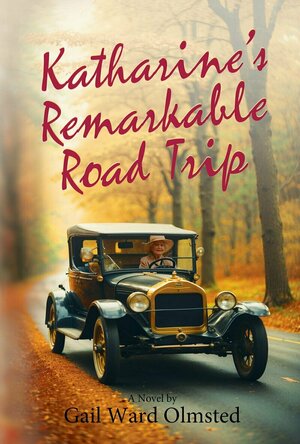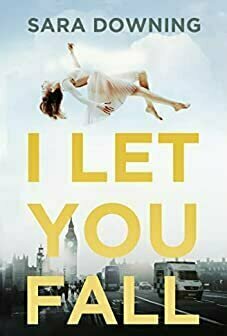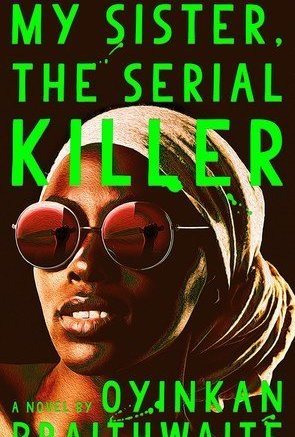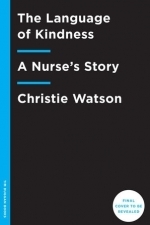Search
Merissa (13770 KP) rated I Let You Fall in Books
Sep 6, 2022
A well-paced, interesting story that had me gripped.
I LET YOU FALL is a standalone story about a young woman in a coma and the adventure she has.
You'd think that nothing would be happening, right? Wrong! You get two lots of story here - one with Eve's 'spirit' or whatever you want to call it, plus Eve's body and whatever consciousness and understanding that is left.
I have to say, I found the beginning slightly confusing. It said about it being after the accident but it wasn't exactly clear what was happening, so I wasn't sure if that is actually what had sent her to the hospital in the first place. Stick with it though, as it does make sense in the end. Another part I found confusing was when Luca left. How could Eve see so much misery and upset when the nurse was happy to give the news she gave?
Anyway, they are minor things. The story as a whole was a brilliant read that kept my focus all the way through. I loved reading the two different sides as they tried to understand what was happening around them. The ending is left wide open for you to imagine your own love story.
A well-paced, interesting story that had me gripped. I thoroughly enjoyed this and have no hesitation in recommending it.
** same worded review will appear elsewhere **
* A copy of this book was provided to me with no requirements for a review. I voluntarily read this book, and the comments here are my honest opinion. *
Merissa
Archaeolibrarian - I Dig Good Books!
You'd think that nothing would be happening, right? Wrong! You get two lots of story here - one with Eve's 'spirit' or whatever you want to call it, plus Eve's body and whatever consciousness and understanding that is left.
I have to say, I found the beginning slightly confusing. It said about it being after the accident but it wasn't exactly clear what was happening, so I wasn't sure if that is actually what had sent her to the hospital in the first place. Stick with it though, as it does make sense in the end. Another part I found confusing was when Luca left. How could Eve see so much misery and upset when the nurse was happy to give the news she gave?
Anyway, they are minor things. The story as a whole was a brilliant read that kept my focus all the way through. I loved reading the two different sides as they tried to understand what was happening around them. The ending is left wide open for you to imagine your own love story.
A well-paced, interesting story that had me gripped. I thoroughly enjoyed this and have no hesitation in recommending it.
** same worded review will appear elsewhere **
* A copy of this book was provided to me with no requirements for a review. I voluntarily read this book, and the comments here are my honest opinion. *
Merissa
Archaeolibrarian - I Dig Good Books!

Katharine's Remarkable Road Trip
Book
In the fall of 1907, Katharine decides to drive from Newport, Rhode Island, to her home in Jackson,...
Historical Fiction Civil War Nurses Biographical Fiction Women In History
Merissa (13770 KP) rated Chimera's Prisoner (Prime Omegaverse #6) in Books
Jun 10, 2025
CHIMERA'S PRISONER is the sixth book in the Prime Omegaverse series, and if you haven't figured it out yet, the trigger warnings are there for a reason. This is a dark monster romance with dub-con. If that's not your thing, move along.
Amelia is a nurse who has been captured by the felines for transportation to a breeding centre. Funnily enough, she's none too keen on the idea. When Mother Nature sends a storm to help out, she is quick to take advantage. Unfortunately for her, Vex is flying overhead, patrolling his territory, when he spots her and scents her.
I loved Vex! Yes, he was an Alpha, but he also had a heart. And although he knew from the beginning that Amelia was his, he wasn't obnoxious about it either, unlike some of the others I've read.
With some high heat, this story also had emotions, connections, and action. The Council are none too pleased with Vex claiming Amelia and will do anything to retrieve her.
I wasn't too keen on the last book, but I did enjoy this one a lot more. Chapter 16 was repeated in my copy, but on the whole, there were fewer repetitions than in previous stories. I am hoping for all the stories to connect at some point, but am enjoying the different scenarios as they each conclude.
** Same worded review will appear elsewhere. **
* A copy of this book was provided to me with no requirements for a review. I voluntarily read this book; the comments here are my honest opinion. *
Merissa
Archaeolibrarian - I Dig Good Books!
Jun 10, 2025
Amelia is a nurse who has been captured by the felines for transportation to a breeding centre. Funnily enough, she's none too keen on the idea. When Mother Nature sends a storm to help out, she is quick to take advantage. Unfortunately for her, Vex is flying overhead, patrolling his territory, when he spots her and scents her.
I loved Vex! Yes, he was an Alpha, but he also had a heart. And although he knew from the beginning that Amelia was his, he wasn't obnoxious about it either, unlike some of the others I've read.
With some high heat, this story also had emotions, connections, and action. The Council are none too pleased with Vex claiming Amelia and will do anything to retrieve her.
I wasn't too keen on the last book, but I did enjoy this one a lot more. Chapter 16 was repeated in my copy, but on the whole, there were fewer repetitions than in previous stories. I am hoping for all the stories to connect at some point, but am enjoying the different scenarios as they each conclude.
** Same worded review will appear elsewhere. **
* A copy of this book was provided to me with no requirements for a review. I voluntarily read this book; the comments here are my honest opinion. *
Merissa
Archaeolibrarian - I Dig Good Books!
Jun 10, 2025
Hazel (1853 KP) rated Small Great Things in Books
May 24, 2017
Small is an Understatement
Jodi Picoult has been my favourite author since I first came across her novels in 2008. With twenty-three novels under her belt, she continues to delight readers with her page-turning stories. Most of Picoult’s books contain a moral issue, often, but not always, in the form of medical ethics, as well as a hefty court case. Although following along similar lines, Small Great Things is a radical, revolutionary book, which, with great courage, Picoult has written with the intent to expose the reader to truths that most of us, as a society, are intentionally oblivious to.
The gist of the storyline is that a baby dies whilst under the care of a nurse, prompting the grieving parents to take her to court with the accusation of murder. Although that sounds like an interesting story, it barely begins to describe what the book is about. The character on trial, Ruth, is an African American labour and delivery nurse – something that in this day and age need not by an issue. On the other hand, the parents of the baby are White Supremacists: seriously racist with the belief that white people are the master race. The father, Turk, refuses to let his wife and child be treated by Ruth, however circumstances result in her being the only nurse available to watch Davis, when, unfortunately, he so happens to go into cardiac arrest. Although the reader knows that Ruth is not at fault, Turk insists she murdered his child – but is he accusing her of medical negligence, or punishing her for being black?
Three characters, all with different views and experience when it comes to racism, alternately narrate Small Great Things. Ruth and Turk represent the extremes at either side of the scale. Ruth experiences first hand the negative impact of prejudice in the American system and society, not only through this court case, but in everyday life as well. She also reveals the difficulties growing up in a predominately white environment, never feeling like she fitted in with her peers. Alternatively, Turk spent his teenage years attending KKK rallies, participating in a white power movement, and beating up anyone who was different: black, foreign, gay, Jewish and so forth.
The third character represents the majority of white people living in America. Kennedy is a public defender and the lawyer assigned to Ruth’s case. Like most of the population, she believes that she is not racist, and persuades Ruth to leave the colour of her skin out of the argument. However, as she gets to know her client, she begins to realize that it is nigh on impossible to ignore racial prejudice.
Picoult shocks the reader on two accounts: one, the way that people of colour have been, and still are, treated; and two, the revelation that an invisible empire of White Supremacists are living amongst us. Yet there is a third way in which Picoult provokes outrage – she indirectly accuses the reader of being racist, too.
There is always something to learn in a Jodi Picoult novel, for instance medical terminology, or the way in which a court trial is conducted. Small Great Things provides a lot more eye opening information than any of her previous books, unveiling facts about such a controversial subject.
Through Kennedy, the reader’s eyes are opened to the racial discrimination that we all turn a blind eye to. Ignored are the difficulties African Americans suffer when going shopping, applying for jobs, attending school, walking down the street, sitting on a bus, and so forth. Picoult asks me as a reader to think about how my life has been affected by racial discrimination: being served politely in shops because I am white, not having my ethnicity questioned when applying for college etc. Living in Britain I have not experienced openly hateful comments or behaviours towards people with a different skin tone – I used to believe this was primarily an American problem. Yet, Small Great Things has really made me think about the hierarchy of power within society, particularly in regards to the ethnicity of those at the top, compared with those at the bottom.
Jodi Picoult sat on the idea of writing a book about racism for well over a decade, yet it is particularly apt that it is published now, with the current predicaments America is facing. Although we have come a long way in attempts to achieve equality for all – compare the trial in To Kill A Mockingbird to Picoult’s version – recent events have revealed that we are no where near.
Small Great Things will shock everyone who reads it regardless of their ethnicity and so forth. Many may find it uncomfortable to read, become upset or outraged, and even feel like they are being directly targeted. If this is the case, then good – it should do that. Everyone needs to read this book. On the one hand it is a brilliant, well told story with a beautiful, almost poetic narrative, and on the other, it causes us to face up to the issues we are forever making light of or overlooking entirely. We have grown up believing that racism is a form of hatred when, actually, it is about power. However Small Great Things makes you feel, it is definitely worth reading, especially for the satisfying ending – one that you do not see coming.
The gist of the storyline is that a baby dies whilst under the care of a nurse, prompting the grieving parents to take her to court with the accusation of murder. Although that sounds like an interesting story, it barely begins to describe what the book is about. The character on trial, Ruth, is an African American labour and delivery nurse – something that in this day and age need not by an issue. On the other hand, the parents of the baby are White Supremacists: seriously racist with the belief that white people are the master race. The father, Turk, refuses to let his wife and child be treated by Ruth, however circumstances result in her being the only nurse available to watch Davis, when, unfortunately, he so happens to go into cardiac arrest. Although the reader knows that Ruth is not at fault, Turk insists she murdered his child – but is he accusing her of medical negligence, or punishing her for being black?
Three characters, all with different views and experience when it comes to racism, alternately narrate Small Great Things. Ruth and Turk represent the extremes at either side of the scale. Ruth experiences first hand the negative impact of prejudice in the American system and society, not only through this court case, but in everyday life as well. She also reveals the difficulties growing up in a predominately white environment, never feeling like she fitted in with her peers. Alternatively, Turk spent his teenage years attending KKK rallies, participating in a white power movement, and beating up anyone who was different: black, foreign, gay, Jewish and so forth.
The third character represents the majority of white people living in America. Kennedy is a public defender and the lawyer assigned to Ruth’s case. Like most of the population, she believes that she is not racist, and persuades Ruth to leave the colour of her skin out of the argument. However, as she gets to know her client, she begins to realize that it is nigh on impossible to ignore racial prejudice.
Picoult shocks the reader on two accounts: one, the way that people of colour have been, and still are, treated; and two, the revelation that an invisible empire of White Supremacists are living amongst us. Yet there is a third way in which Picoult provokes outrage – she indirectly accuses the reader of being racist, too.
There is always something to learn in a Jodi Picoult novel, for instance medical terminology, or the way in which a court trial is conducted. Small Great Things provides a lot more eye opening information than any of her previous books, unveiling facts about such a controversial subject.
Through Kennedy, the reader’s eyes are opened to the racial discrimination that we all turn a blind eye to. Ignored are the difficulties African Americans suffer when going shopping, applying for jobs, attending school, walking down the street, sitting on a bus, and so forth. Picoult asks me as a reader to think about how my life has been affected by racial discrimination: being served politely in shops because I am white, not having my ethnicity questioned when applying for college etc. Living in Britain I have not experienced openly hateful comments or behaviours towards people with a different skin tone – I used to believe this was primarily an American problem. Yet, Small Great Things has really made me think about the hierarchy of power within society, particularly in regards to the ethnicity of those at the top, compared with those at the bottom.
Jodi Picoult sat on the idea of writing a book about racism for well over a decade, yet it is particularly apt that it is published now, with the current predicaments America is facing. Although we have come a long way in attempts to achieve equality for all – compare the trial in To Kill A Mockingbird to Picoult’s version – recent events have revealed that we are no where near.
Small Great Things will shock everyone who reads it regardless of their ethnicity and so forth. Many may find it uncomfortable to read, become upset or outraged, and even feel like they are being directly targeted. If this is the case, then good – it should do that. Everyone needs to read this book. On the one hand it is a brilliant, well told story with a beautiful, almost poetic narrative, and on the other, it causes us to face up to the issues we are forever making light of or overlooking entirely. We have grown up believing that racism is a form of hatred when, actually, it is about power. However Small Great Things makes you feel, it is definitely worth reading, especially for the satisfying ending – one that you do not see coming.
Hazel (1853 KP) rated Small Great Things in Books
Dec 7, 2018
Jodi Picoult has been my favourite author since I first came across her novels in 2008. With twenty-three novels under her belt, she continues to delight readers with her page-turning stories. Most of Picoult’s books contain a moral issue, often, but not always, in the form of medical ethics, as well as a hefty court case. Although following along similar lines, <i>Small Great Thing</i>s is a radical, revolutionary book, which, with great courage, Picoult has written with the intent to expose the reader to truths that most of us, as a society, are <s>intentionally</s> oblivious to.
The gist of the storyline is that a baby dies whilst under the care of a nurse, prompting the grieving parents to take her to court with the accusation of murder. Although that sounds like an interesting story, it barely begins to describe what the book is about. The character on trial, Ruth, is an African American labour and delivery nurse – something that in this day and age need not by an issue. On the other hand, the parents of the baby are White Supremacists: seriously racist with the belief that white people are the master race. The father, Turk, refuses to let his wife and child be treated by Ruth, however circumstances result in her being the only nurse available to watch Davis, when, unfortunately, he so happens to go into cardiac arrest. Although the reader knows that Ruth is not at fault, Turk insists she murdered his child – but is he accusing her of medical negligence, or punishing her for being black?
Three characters, all with different views and experience when it comes to racism, alternately narrate<i> Small Great Things</i>. Ruth and Turk represent the extremes at either side of the scale. Ruth experiences first hand the negative impact of prejudice in the American system and society, not only through this court case, but in everyday life as well. She also reveals the difficulties growing up in a predominately white environment, never feeling like she fitted in with her peers. Alternatively, Turk spent his teenage years attending KKK rallies, participating in a white power movement, and beating up anyone who was different: black, foreign, gay, Jewish and so forth.
The third character represents the majority of white people living in America. Kennedy is a public defender and the lawyer assigned to Ruth’s case. Like most of the population, she believes that she is not racist, and persuades Ruth to leave the colour of her skin out of the argument. However, as she gets to know her client, she begins to realize that it is nigh on impossible to ignore racial prejudice.
Picoult shocks the reader on two accounts: one, the way that people of colour have been, and still are, treated; and two, the revelation that an invisible empire of White Supremacists are living amongst us. Yet there is a third way in which Picoult provokes outrage – she indirectly accuses the reader of being racist, too.
There is always something to learn in a Jodi Picoult novel, for instance medical terminology, or the way in which a court trial is conducted. <i>Small Great Things</i> provides a lot more eye opening information than any of her previous books, unveiling facts about such a controversial subject.
Through Kennedy, the reader’s eyes are opened to the racial discrimination that we all turn a blind eye to. Ignored are the difficulties African Americans suffer when going shopping, applying for jobs, attending school, walking down the street, sitting on a bus, and so forth. Picoult asks me as a reader to think about how my life has been affected by racial discrimination: being served politely in shops because I am white, not having my ethnicity questioned when applying for college etc. Living in Britain I have not experienced openly hateful comments or behaviours towards people with a different skin tone – I used to believe this was primarily an American problem. Yet, <i>Small Great Things</i> has really made me think about the hierarchy of power within society, particularly in regards to the ethnicity of those at the top, compared with those at the bottom.
Jodi Picoult sat on the idea of writing a book about racism for well over a decade, yet it is particularly apt that it is published now, with the current predicaments America is facing. Although we have come a long way in attempts to achieve equality for all – compare the trial in <i>To Kill A Mockingbird</i> to Picoult’s version – recent events have revealed that we are no where near.
<i>Small Great Things</i> will shock everyone who reads it regardless of their ethnicity and so forth. Many may find it uncomfortable to read, become upset or outraged, and even feel like they are being directly targeted. If this is the case, then good – it should do that. Everyone needs to read this book. On the one hand it is a brilliant, well told story with a beautiful, almost poetic narrative, and on the other, it causes us to face up to the issues we are forever making light of or overlooking entirely. We have grown up believing that racism is a form of hatred when, actually, it is about power. However <i>Small Great Things </i>makes you feel, it is definitely worth reading, especially for the satisfying ending – one that you do not see coming.
The gist of the storyline is that a baby dies whilst under the care of a nurse, prompting the grieving parents to take her to court with the accusation of murder. Although that sounds like an interesting story, it barely begins to describe what the book is about. The character on trial, Ruth, is an African American labour and delivery nurse – something that in this day and age need not by an issue. On the other hand, the parents of the baby are White Supremacists: seriously racist with the belief that white people are the master race. The father, Turk, refuses to let his wife and child be treated by Ruth, however circumstances result in her being the only nurse available to watch Davis, when, unfortunately, he so happens to go into cardiac arrest. Although the reader knows that Ruth is not at fault, Turk insists she murdered his child – but is he accusing her of medical negligence, or punishing her for being black?
Three characters, all with different views and experience when it comes to racism, alternately narrate<i> Small Great Things</i>. Ruth and Turk represent the extremes at either side of the scale. Ruth experiences first hand the negative impact of prejudice in the American system and society, not only through this court case, but in everyday life as well. She also reveals the difficulties growing up in a predominately white environment, never feeling like she fitted in with her peers. Alternatively, Turk spent his teenage years attending KKK rallies, participating in a white power movement, and beating up anyone who was different: black, foreign, gay, Jewish and so forth.
The third character represents the majority of white people living in America. Kennedy is a public defender and the lawyer assigned to Ruth’s case. Like most of the population, she believes that she is not racist, and persuades Ruth to leave the colour of her skin out of the argument. However, as she gets to know her client, she begins to realize that it is nigh on impossible to ignore racial prejudice.
Picoult shocks the reader on two accounts: one, the way that people of colour have been, and still are, treated; and two, the revelation that an invisible empire of White Supremacists are living amongst us. Yet there is a third way in which Picoult provokes outrage – she indirectly accuses the reader of being racist, too.
There is always something to learn in a Jodi Picoult novel, for instance medical terminology, or the way in which a court trial is conducted. <i>Small Great Things</i> provides a lot more eye opening information than any of her previous books, unveiling facts about such a controversial subject.
Through Kennedy, the reader’s eyes are opened to the racial discrimination that we all turn a blind eye to. Ignored are the difficulties African Americans suffer when going shopping, applying for jobs, attending school, walking down the street, sitting on a bus, and so forth. Picoult asks me as a reader to think about how my life has been affected by racial discrimination: being served politely in shops because I am white, not having my ethnicity questioned when applying for college etc. Living in Britain I have not experienced openly hateful comments or behaviours towards people with a different skin tone – I used to believe this was primarily an American problem. Yet, <i>Small Great Things</i> has really made me think about the hierarchy of power within society, particularly in regards to the ethnicity of those at the top, compared with those at the bottom.
Jodi Picoult sat on the idea of writing a book about racism for well over a decade, yet it is particularly apt that it is published now, with the current predicaments America is facing. Although we have come a long way in attempts to achieve equality for all – compare the trial in <i>To Kill A Mockingbird</i> to Picoult’s version – recent events have revealed that we are no where near.
<i>Small Great Things</i> will shock everyone who reads it regardless of their ethnicity and so forth. Many may find it uncomfortable to read, become upset or outraged, and even feel like they are being directly targeted. If this is the case, then good – it should do that. Everyone needs to read this book. On the one hand it is a brilliant, well told story with a beautiful, almost poetic narrative, and on the other, it causes us to face up to the issues we are forever making light of or overlooking entirely. We have grown up believing that racism is a form of hatred when, actually, it is about power. However <i>Small Great Things </i>makes you feel, it is definitely worth reading, especially for the satisfying ending – one that you do not see coming.
Debbiereadsbook (1656 KP) rated A Love To Remember in Books
May 1, 2018
so desperately wanted to hear from Sam!
Independent reviewer for Archaeolibrarian, I was gifted my copy of this book.
Graham takes his dad to the cabin in the woods, because he cannot be on his own anymore. Ravaged by Alzheimer's, his father needs calm, and peace. But Graham can no longer look after his dad and work, so he hires an in-home nurse, Sam. Sam and Graham have met before, after a brief hook-up. Sam wants more, but Graham has to take a step back, and make Sam realise, what's slowly killing his father could very well kill him too.
It's only short, this one, some 85 pages, but Brook manages to get a lot in those 85 pages!
We get the intensity of that initial hook-up. We get all of Graham's fears for his dad. We get all of Graham's emotions trying to keep Sam at arms length, while fighting to pull him close. We get all of GRAHAM.
What we don't get is Sam. Any Sam, at all. And that's the only reason I'm giving it 4 stars, because it is single person point of view. Had Sam had a say, this could well have been a 5 star read, it really could!
It's not overly complicated, just two men falling in love while one tries really hard not to. There is no major breakup/make up, no nutty exes. It has some sexy time, and some emotional times, especially when Graham is fighting with himself to look after dad but having to admit that he really can't.
It really is a lovely, if short, read. Passed an hour, while watching the rain, on a Sunday afternoon.
4 solid stars
**same worded review will appear elsewhere**
Graham takes his dad to the cabin in the woods, because he cannot be on his own anymore. Ravaged by Alzheimer's, his father needs calm, and peace. But Graham can no longer look after his dad and work, so he hires an in-home nurse, Sam. Sam and Graham have met before, after a brief hook-up. Sam wants more, but Graham has to take a step back, and make Sam realise, what's slowly killing his father could very well kill him too.
It's only short, this one, some 85 pages, but Brook manages to get a lot in those 85 pages!
We get the intensity of that initial hook-up. We get all of Graham's fears for his dad. We get all of Graham's emotions trying to keep Sam at arms length, while fighting to pull him close. We get all of GRAHAM.
What we don't get is Sam. Any Sam, at all. And that's the only reason I'm giving it 4 stars, because it is single person point of view. Had Sam had a say, this could well have been a 5 star read, it really could!
It's not overly complicated, just two men falling in love while one tries really hard not to. There is no major breakup/make up, no nutty exes. It has some sexy time, and some emotional times, especially when Graham is fighting with himself to look after dad but having to admit that he really can't.
It really is a lovely, if short, read. Passed an hour, while watching the rain, on a Sunday afternoon.
4 solid stars
**same worded review will appear elsewhere**
Amy Christmas (171 KP) rated My Sister, the Serial Killer in Books
Feb 4, 2019
Short and sweet (1 more)
Characters are well built and easy to connect with
The ending (1 more)
Lack of retribution
Infuriatingly good
Contains spoilers, click to show
I loved this book, in fact I read it in one sitting I just couldn't let the anger it infused in me settle.
Korede is our main character, she's a nurse and her sister is a narcissistic selfish serial killer. The book opens with Korede cleaning up one of her Ayoolas messes.
At first you might be mistaken thinking that Ayoola is just nïave, you'd be wrong. We come to learn that she knows exactly what she's doing and it is killing Korede, the big sister that will forever love her little sister, even if it pains the reader.
Korede is fine with her sisters killing it's seems though the last one unsettled something within her,raising a question that must be answered; should she tell the police?
Most with siblings might say no because they're family, this is at first the stance Korede takes. However when Ayoola, possibly trying to make up for inconveniencing her sister via a dead body visits her at work and settles her eyes on Tade.
I loved Tade to begin with. Slowly you learn he's just as much of an arsehole as the next berating Korede for being mean to her sister, even when Korede warns him she's dangerous.
While all of this is going on Korede confides all her secrets to a coma patient it calms her, but when he wakes up who knows what he's remembered.
In the end the question of whether to turn Ayoola in or not returns, and this is where the story went downhill for me, as Korede herself allows Ayoola to manipulate her, only to bring home a new man the next day.
Will I read it again?
Maybe, who's to know?
Korede is our main character, she's a nurse and her sister is a narcissistic selfish serial killer. The book opens with Korede cleaning up one of her Ayoolas messes.
At first you might be mistaken thinking that Ayoola is just nïave, you'd be wrong. We come to learn that she knows exactly what she's doing and it is killing Korede, the big sister that will forever love her little sister, even if it pains the reader.
Korede is fine with her sisters killing it's seems though the last one unsettled something within her,raising a question that must be answered; should she tell the police?
Most with siblings might say no because they're family, this is at first the stance Korede takes. However when Ayoola, possibly trying to make up for inconveniencing her sister via a dead body visits her at work and settles her eyes on Tade.
I loved Tade to begin with. Slowly you learn he's just as much of an arsehole as the next berating Korede for being mean to her sister, even when Korede warns him she's dangerous.
While all of this is going on Korede confides all her secrets to a coma patient it calms her, but when he wakes up who knows what he's remembered.
In the end the question of whether to turn Ayoola in or not returns, and this is where the story went downhill for me, as Korede herself allows Ayoola to manipulate her, only to bring home a new man the next day.
Will I read it again?
Maybe, who's to know?
Bubblesreview (110 KP) rated The Language of Kindness: A Nurse's Story in Books
Mar 17, 2019
Pros:
• Daily insights into a nurses life
• Beautiful and emotional
• Insight into the NHS
• Promotes kindness
Cons:
• Bit to self-indulgent
• it's missing something, a flow
• Ended a bit abruptly for me
Christie Watson was a nurse for twenty years. Taking us from birth to death and from A&E to the mortuary, The Language of Kindness is an astounding account of a profession defined by acts of care, compassion and kindness.
@mooksterbooks bought me this book after I thoroughly enjoyed This is Going to Hurt by Adam Kay.
I absolutely LOVE reading memoirs of nurses and doctors and seeing inside the NHS system.
Watson wrote her memoir in more of an attempted flowed novel unlike Kays diary entries take. I won't compare the two books too much but I must say I did enjoy the presentation of Kay's diary entries.
Looking at other reviews on this book I found that there is mixed views and some not very nice comments on it. I don't agree with the ones who say this was hyped up too much as I feel it wasn't hyped up at all, but I do slightly agree on the ones who feel it was a little too self-indulged and didn't flow too great.
Aside from this, I can't say I didn't enjoy this book, I really did enjoy reading it and I was a little saddened when it ended. I loved all the beautiful stories and the emotional ones, it bought me joy, sadness and a passion to promote caring and kindness.
I would recommend this book to anyone who enjoys reading memoirs, to those who like to see the truth behind the masks of nurses and doctors but I wouldn't recommend this to people who have anxiety about hospitals as some parts were a bit too honest and gory.
• Daily insights into a nurses life
• Beautiful and emotional
• Insight into the NHS
• Promotes kindness
Cons:
• Bit to self-indulgent
• it's missing something, a flow
• Ended a bit abruptly for me
Christie Watson was a nurse for twenty years. Taking us from birth to death and from A&E to the mortuary, The Language of Kindness is an astounding account of a profession defined by acts of care, compassion and kindness.
@mooksterbooks bought me this book after I thoroughly enjoyed This is Going to Hurt by Adam Kay.
I absolutely LOVE reading memoirs of nurses and doctors and seeing inside the NHS system.
Watson wrote her memoir in more of an attempted flowed novel unlike Kays diary entries take. I won't compare the two books too much but I must say I did enjoy the presentation of Kay's diary entries.
Looking at other reviews on this book I found that there is mixed views and some not very nice comments on it. I don't agree with the ones who say this was hyped up too much as I feel it wasn't hyped up at all, but I do slightly agree on the ones who feel it was a little too self-indulged and didn't flow too great.
Aside from this, I can't say I didn't enjoy this book, I really did enjoy reading it and I was a little saddened when it ended. I loved all the beautiful stories and the emotional ones, it bought me joy, sadness and a passion to promote caring and kindness.
I would recommend this book to anyone who enjoys reading memoirs, to those who like to see the truth behind the masks of nurses and doctors but I wouldn't recommend this to people who have anxiety about hospitals as some parts were a bit too honest and gory.
Kristy H (1252 KP) rated The New Neighbor in Books
Feb 13, 2018
Elderly Margaret Riley lives alone in rural Tennessee. She seeks comfort in her mystery novels and her memories - not other people. One day Margaret looks across her pond and realizes she has a new neighbor. Margaret becomes intrigued and eventually meets the young woman, Jennifer, and her son, Milo. Margaret begins telling Jennifer about her past and finds herself increasingly curious about Jennifer's own past. Why are she and Milo in Tennessee? What is Jennifer not telling her? Fancying herself a detective similar to those in her beloved novels, will Margaret unveil Jennifer's secrets?
The novel reveals its stories (and secrets) through varying narratives - mainly those of Margaret and Jennifer. We see Margaret's increasing curiosity about Jennifer's life and Jennifer's own increasing reluctance to share why she and Milo have left their old life behind. Further, we see that the two women may not be as different as they appear. Margaret begins telling Jennifer about her life as a nurse during the War, while we learn about Jennifer's life with her drunken husband. Suddenly, the parallels between the two women -- especially when pushed to the brink -- seem surprisingly clear.
This was an intriguing book, in many ways. Neither Margaret nor Jennifer are incredibly likable characters (Margaret is often your classic "old biddy" for sure), but they are interesting. In some ways, nothing really happens in the book - a lot of the action has happened in the past, and we're simply learning about it as Margaret and Jennifer reveal their respective pasts and secrets. Still, it's an insightful look into the two woman's lives - I found it quite compelling. The end was somewhat fascinating, though it did seem to fall a bit flat after all the buildup. Still, a solid 3.5 stars.
The novel reveals its stories (and secrets) through varying narratives - mainly those of Margaret and Jennifer. We see Margaret's increasing curiosity about Jennifer's life and Jennifer's own increasing reluctance to share why she and Milo have left their old life behind. Further, we see that the two women may not be as different as they appear. Margaret begins telling Jennifer about her life as a nurse during the War, while we learn about Jennifer's life with her drunken husband. Suddenly, the parallels between the two women -- especially when pushed to the brink -- seem surprisingly clear.
This was an intriguing book, in many ways. Neither Margaret nor Jennifer are incredibly likable characters (Margaret is often your classic "old biddy" for sure), but they are interesting. In some ways, nothing really happens in the book - a lot of the action has happened in the past, and we're simply learning about it as Margaret and Jennifer reveal their respective pasts and secrets. Still, it's an insightful look into the two woman's lives - I found it quite compelling. The end was somewhat fascinating, though it did seem to fall a bit flat after all the buildup. Still, a solid 3.5 stars.

Bugs & Drugs
Medical and Reference
App
The Bugs & Drugs Antimicrobial/Infectious Disease Reference is now available as an iPhone app! Bugs...






